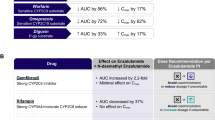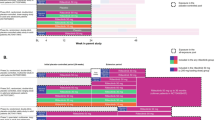Abstract
The introduction of serotonin receptor (5-HT3) antagonists has improved the control of acute nausea and vomiting induced by cancer chemotherapy, but they seem to have little or no effect on delayed symptoms. Corticosteroids are known to reduce both acute and delayed nausea and vomiting. The aim of the present study was to test the hypothesis that a single high dose of dexamethasone (20 mg), a long-acting corticosteroid, given after cisplatin and in addition to ondansetron (8 mg three times a day), would enhance the control of both acute and delayed nausea and vomiting. A group of 104 chemotherapy-naive ovarian cancer patients, scheduled for at least three cycles of combination chemotherapy including cisplatin (50 mg/m2), were randomly allocated to receive either dexamethasone or placebo in addition to ondansetron. Two-thirds of the patients received doxorubin and melphalan on the day before cisplatin and 1/3 received doxorubicin immediately before cisplatin. Unexpectedly we found, in all three chemotherapy cycles, that patients receiving dexamethasone suffered from more delayed nausea and vomiting than patients receiving placebo. In patients with no acute nausea or vomiting, the boomerang effect of dexamethasone could be seen on the first day after chemotherapy. In a follow-up study on 5 patients not included in the randomized trial, dexamethasone induced a pronounced reduction in urinary cortisol excretion on the day after chemotherapy with a return to normal excretion on day 2. It is concluded that a single high dose of dexamethasone does not seem appropriate for controlling delayed nausea and vomiting.
Similar content being viewed by others
References
Aapro MS, Alberts DS (1981) Highdose dexamethasone for prevention of cisplatin-induced vomiting. Cancer Chemother Pharmacol 7: 11–14
Andrews PL, Davis CJ (1993) The mechanism of emesis induced by anticancer therapies. In: Andrews PL, Sanger GJ (eds) Emesis in anticancer therapy. Mechanisms and management. Chapman & Hall, London, pp 113–161
Borcovec TD (1976) Physiological and cognitive processes in the regulation of anxiety. In: Schwartz GE, Shapiro S (eds) Consciousness and selfregulation. (Advances in research) Plenum Press, New York, pp 261–312
Carmichael J, Bessel EM, Harris AL, Hucheon AW, Dawes PJDK, Daniels S (1994) Comparison of granisetrone alone and granisetron plus dexame thasone in the prophylaxis of cytotoxic-induced emesis. Br J Cancer 70: 1161–1164
Del Favero A, Roila F, Tonato M (1993) Reducing chemotherapy-induced nausea and vomiting. Current perspectives and future possibilities. Drug Safety 9: 410–428
Eysenck HJ, Eysenck SBG (1975) Manual of the Eysenck Personality Questionnaire. Hodder and Stoughton, London
Fredrikson M, Hursti T, Mirst CJ, et al (1992) Nausea in cancer chemotherapy is inversely related to urinary cortisol excretion. Br J Cancer 65: 779–780
Greenland S, Robins JM (1985) Estimation of a common effect parameter from sparse follow-up data. Biometrics 41:55–68
Haid M (1981) Steroid antiemetics may be harmful. N Engl J Med 304:1237
Hursti T, Fredrikson M, Steineck G, Börjeson S, Fürst CJ, Peterson C (1993) Endogenous cortisol exerts antiemetic effects similar to that of exogenous corticosteroids. Br J Cancer 68:112–114
Hursti T, Fredrikson M, Steineck G, Börjeson S, Fürst CJ, Peterson C (1994) Factors modifying the risk of acute and conditioned nausea and vomiting in ovarian cancer patients. Int J Oncol 41:695–701
Jones AL, Hill AS, Soukop M, et al (1991) Comparison of dexamethasone and ondansetron in the prophylaxis of emesis induced by moderately emetogenic chemotherapy. Lancet 338:483–487
Joss RA, Bacchi M, Buser K, et al (1994) Ondansetron plus dexamethasone is superior to ondansetron alone in the prevention of emesis in chemotherapy-naive and previously treated patients. Ann Oncol 5:253–258
Kris MG, Gralla RJ, Clarke RA, et al (1985) Incidence, course and severity of delayed emesis and vomiting following the administration of high dose cisplatin. J Clin Oncol 3:1379–1384
Kris MK, Tyson LB, Baltzer L, Pisters KMW (1991) Clinical trials in acute chemotherapy-induced vomiting. In: Bianchi AL, Grélot L, Miller AD, King GL (eds) Mechanisms and control of emesis. (Colloque INSERM, vol 223) Libbey Eurotext, Montrouge, pp 129–139
Kris MG, Tyson LB, Clarke RA, Gralla RJ (1992) Oral ondansetron for the control of delayed emesis after cisplatin. Cancer 70 [Suppl]:1012–1016
Markman M, Sheidler V, Ettinger DS, Quaskey SA, Mellits ED (1984) Antiemetic efficacy of dexamethasone: randomized double-blind, crossover study with prochloperazine in patients receiving cancer chemotherapy. N Engl J Med 311:549–552
Powell, CB, Mutch DG, Kao M-S, et al (1990) Dexamethasone used as an antiemetic in chemotherapy protocols inhibits natural cytotoxic (NC) cell activity. Cancer 65:466–472
Roila F, Tonato M, Cognetti F, et al (1991) Prevention of cisplatin-induced emesis: a double-blind multicenter randomized crossover study comparing ondansetron and ondansetron plus dexamethasone. J Clin Oncol 9:675–678
Roila F, the Italian Group for Antiemetic Research (1995) Dexamethasone, granisetrone, or both for the prevention of nausea and vomiting during chemotherapy for cancer. N Engl J Med 332:1–5
Smith DB, Newland ES, Rustin GJS, et al (1991) Comparison of ondansetron and ondansetron plus dexame thasone as antiemetic prophylaxis during cisplatin-containing chemotherapy. Lancet 338:487–490
Spielberger CD, Gorsuch RL, Lushene R (1968) The State Anxiety Inventory (STAI). Consulting Psycho logists Press, Palo Alto, Calif
Author information
Authors and Affiliations
Rights and permissions
About this article
Cite this article
Peterson, C., Hursti, T.J., Börjeson, S. et al. Single high-dose dexamethasone improves the effect of ondansetron on acute chemotherapy-induced nausea and vomiting but impairs the control of delayed symptoms. Support Care Cancer 4, 440–446 (1996). https://doi.org/10.1007/BF01880642
Issue Date:
DOI: https://doi.org/10.1007/BF01880642




